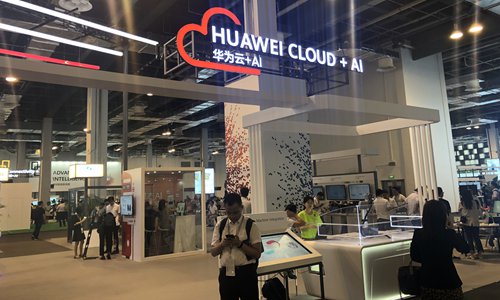HOME >> BUSINESS
Huawei ramps up efforts to build ecosystem
By Shen Weiduo in Shanghai Source:Global Times Published: 2019/9/19 20:38:41
Aims to lure developers in preparation for potential US ban

Visitors at the venue of Huawei Connect 2019 in Shanghai on Thursday. Photo: Shen Weiduo/GT
Chinese technology giant Huawei announced the launch of Huawei Horizon, a digital platform for enterprise developers, and the full opening of its Kunpeng server and desktop boards to developers on Thursday, moves to lure partners and build up its own ecosystems.Since being put on an Entity List by the US government in May due to alleged "national security" concerns, the company has been ramping up efforts to attract more developers in a bid to build up its own ecosystems. It's also an obvious move to prepare for a potential full block by the US side, Michael Zhang, a veteran industry observer told the Global Times on Thursday.
"It is a critical step for Huawei, as without a large amount of developers to create products around the system, and a mature ecosystem behind it, its proprietary operating systems such as the HarmonyOS will have no value," Zhang said.
During the Huawei Connect 2019, a flagship annual event in Shanghai that runs from Wednesday to Friday, Deputy Chairman Ken Hu Houkun reiterated that it will seek to attract more developers in its future computing strategy, which will become the focus of its development path.
"We will invest another $1.5 billion in our development program. We want to expand the program to 5 million more developers and better enable our partners around the world to develop the next generation of intelligent applications and solutions," Hu said.
The Huawei Developer Program began in 2015. It has supported more than 1.3 million developers and 14,000 independent software vendors around the world, according to the company.
However, Zhang pointed out that luring developers might be a tough step for the technology giant, even though its technology can rival other major industry players. "It still takes time, and we have to persuade developers why they have to shift to Huawei instead of Google and Intel," Zhang said.
The company also announced on Thursday a series of products and innovations around its self-developed ecosystem, including the launch of what the company claimed to be the world's most powerful Atlas series of products and 43 cloud services based on Ascend processors, including the Atlas 900 AI cluster, Atlas 300 AI training card, and Atlas 800 AI training server.
Huawei's founder Ren Zhengfei said earlier that its Atlas 900 AI training cluster "performs better than Google and Nvidia."
Hou Jinlong, president of Huawei's cloud and artificial intelligence products and services, also announced its open-source openEuler server OS would be available on December 31, 2020, and openGauss database available in June 2020.
"Step by step, the US ban is forcing the company to grow even bigger," Zhang said.
Posted in: COMPANIES,BIZ FOCUS